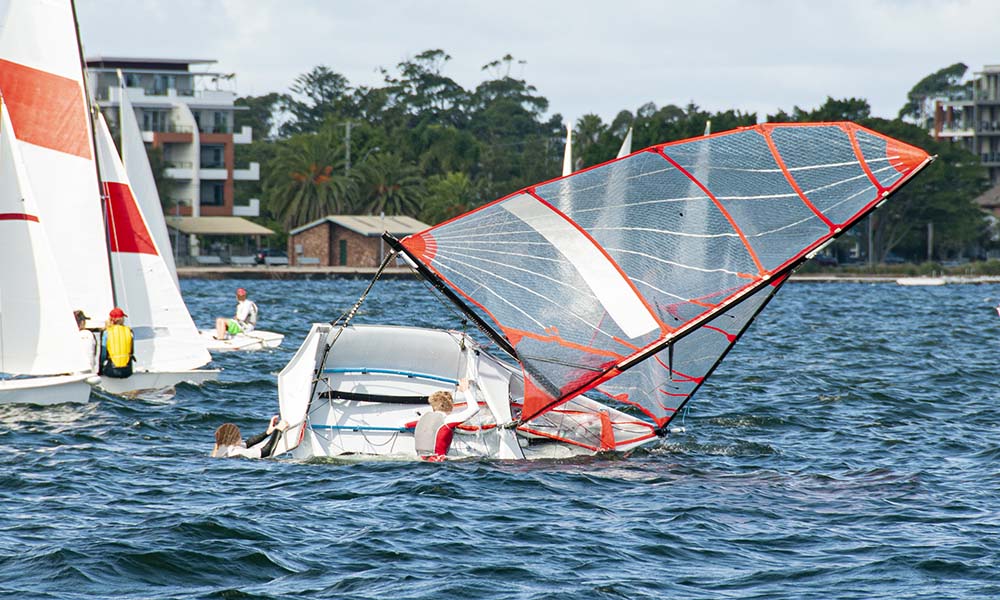Boat Accident Lawyer Lafayette, IN
If you were injured in a boat accident, you should get in touch with a boat accident lawyer Lafayette, IN residents trust. You may be entitled to receive compensation for your losses. A lawyer can help you file a lawsuit against the negligent party and protect your legal rights.

What to Do If You Were in a Boat Accident
Boating accidents, while less common than car accidents, can be just as catastrophic, leading to severe injuries, property damage, and sometimes even fatalities. As residents of Lafayette, Indiana, where water-based activities are popular, understanding what to do in the event of a boat accident is crucial. If you need help understanding what you may be entitled to, contact us at Hall Justice Law Firm.
Immediate Actions Post-Accident
Check for Injuries
- Immediate Assessment: Right after a boat accident, it’s crucial to quickly assess both yourself and others for any injuries. Check for visible wounds, bleeding, signs of shock, or incapacitation. Remember, in such situations, your safety and the safety of others are the top priorities.
- Administer First Aid: If you are trained in first aid and it’s safe to do so, provide necessary assistance to those injured. This can include applying pressure to wounds to control bleeding, ensuring that someone who is unconscious but breathing is in a safe position, and not moving someone who might have spinal injuries unless there is an immediate danger.
Seek Medical Attention
- Immediate Medical Help: Even if the injuries seem minor, it’s essential to seek medical attention immediately. Some injuries, like internal bleeding or concussions, may not be immediately apparent.
- Report All Symptoms: When receiving medical attention, report all symptoms, no matter how minor they may seem. This can include dizziness, nausea, confusion, or disorientation, which can be signs of more serious injuries.
Reporting the Accident
Contact Authorities
- Notifying Law Enforcement: As soon as possible, report the accident to local law enforcement or the Coast Guard. This is particularly important if the accident involves significant property damage, injuries, or fatalities.
- Emergency Services: If there are serious injuries, call 911 or the relevant emergency services immediately.
Filing a Report
- Legal Requirements: Depending on the severity of the accident and local laws, filing a formal report may be legally required. In many places, accidents involving significant damage, injuries, or death must be reported within a specified timeframe.
- Provide Accurate Information: When filing a report, provide accurate and detailed information about the accident. Include the time, location, conditions, and events leading up to the accident.
Gathering Evidence
Document the Scene
- Take Photographs: As soon as it is safe to do so, take comprehensive photographs of the scene. This should include damage to all boats involved, the surrounding area, any injuries sustained, and conditions that may have contributed to the accident, like weather or water conditions.
- Varied Angles: Capture images from various angles and distances to provide a complete overview of the accident scene.
Collect Information
- Exchange Details: Exchange names, contact information, and insurance details with all parties involved in the accident.
- Boat Information: Note down the make, model, registration number, and any other relevant details of the boats involved.
Witness Statements
Identify Witnesses
Gather Contact Information: Collect names and contact information from anyone who witnessed the accident. Bystanders, other boaters in the area, or even passengers can provide valuable accounts of the event.
Record Statements
- Written or Recorded Accounts: If possible and if witnesses consent, obtain written statements or record their verbal accounts of what they observed. This can be invaluable in piecing together the events leading up to the accident.
- Neutrality and Detail: Encourage witnesses to provide neutral, detailed accounts, focusing on what they saw and heard without interpretation or speculation.
Following a boat accident, it’s crucial to ensure the safety and medical well-being of all involved, report the incident to the authorities, and meticulously gather evidence and witness statements. These steps are vital for both immediate safety and for any future legal or insurance processes.
Navigating Legal and Insurance Processes After a Boat Accident
Navigating the aftermath of a boat accident involves a complex interplay between legal procedures and dealing with insurance companies. It’s a process that requires prompt action, detailed documentation, and a keen understanding of your rights and responsibilities.
Notify Your Insurance Company
- Early Notification: It’s imperative to inform your insurance company about the accident as soon as possible. Delay in notification can sometimes lead to complications in claim processing or even denial of the claim. Most insurance policies have specific time frames within which you must report an accident.
- Provide Details: When you contact your insurer, be prepared to provide a comprehensive account of the incident. This includes the date and time of the accident, location, how the accident occurred, and the extent of the damage. It’s beneficial to include photographs of the damage, a copy of the police or Coast Guard report, and any other relevant documentation.
- Documentation: Maintain a record of all communications with your insurance company. Note down the dates of your conversations, the names of the representatives you spoke with, and the specifics of what was discussed. This documentation can be vital if there are discrepancies or disputes later on.
Understand Legal Implications
- Know Your Rights: Understanding your legal rights after a boat accident is critical. This includes knowing what you are entitled to under your insurance policy and understanding the legal responsibilities if there are injuries or significant property damage. Be aware of the statutes of limitations in Indiana for filing injury or property damage claims. Knowing these rights will enable you to make informed decisions and protect your interests.
- Avoid Self-Incrimination: When speaking with insurance adjusters or other parties involved, it’s essential to be cautious about your statements. Avoid making any admissions of fault or speculations about the accident. These statements can be used against you in the claims process or even in legal proceedings. Stick to the facts of the incident as you know them.
- Legal Counsel: Consulting with a boat accident lawyer, especially one experienced in Lafayette, IN, Hall Justice Law Firm, can provide invaluable guidance in understanding and protecting your legal rights. A lawyer can handle communications with your insurance company and other parties, ensuring that your statements do not inadvertently harm your case.
- Negotiations and Settlements: If there’s a need to negotiate settlements, having legal representation ensures that your interests are adequately represented. Insurance companies often aim to minimize payouts, and a skilled lawyer can negotiate to ensure fair compensation, considering medical expenses, lost wages, and other damages.
Navigating legal and insurance processes after a boat accident requires prompt action, careful documentation, and an understanding of your legal rights. Consulting with Hall Justice Law Firm can provide the necessary guidance and representation to effectively manage these processes and protect your interests.
Common Causes of Boat Accidents
Boating is a popular recreational activity in Lafayette, Indiana, offering opportunities for fishing, watersports, and leisurely cruises on the region’s beautiful waterways. However, this enjoyable pastime comes with its risks. Understanding the common causes of boat accidents is essential for prevention and preparedness. In the unfortunate event of an accident, knowing when to contact a boat accident lawyer in Lafayette, IN, like the Hall Justice Law Firm, is crucial for legal guidance and support.
Operator Inattention
A Leading Cause
- Distractions: Distractions can come from electronic devices, passengers, or activities on the boat.
- Consequences of Inattention: Failure to pay attention to the surroundings, weather conditions, and other watercraft can lead to collisions and other dangerous situations.
Preventive Measures
- Focus on Navigation: Prioritize staying focused on the task of navigating the boat.
- Assign a Lookout: Having an extra set of eyes can help in identifying potential hazards.
Inexperienced Operators
Lack of Training and Knowledge
- Underestimating Conditions: Inexperienced boaters might not be prepared to handle sudden weather changes or understand navigational rules.
- Handling Emergencies: Lack of experience can lead to poor decision-making in emergencies.
Importance of Education
- Boating Safety Courses: Encourage all operators to complete certified boating safety courses.
- Gradual Learning: New boaters should gradually increase their exposure to different boating conditions under supervision.
Equipment Failure
Mechanical and Equipment Malfunctions
- Maintenance Neglect: Regular maintenance is essential to prevent equipment failure.
- Critical Failures: Engine problems, steering issues, and navigation equipment failures can lead to accidents.
Regular Checks and Maintenance
- Pre-Departure Checks: Perform thorough checks before each outing.
- Professional Inspections: Regular inspections by qualified professionals can identify potential issues.
Adverse Weather Conditions
Unpredictable Weather
- Sudden Changes: Weather on the water can change rapidly, catching boaters off guard.
- Visibility Issues: Fog, heavy rain, and other conditions can severely reduce visibility.
Weather Planning
- Check Forecasts: Always check the weather forecast before heading out.
- Have a Plan: Develop a plan for seeking shelter in case of unexpected weather changes.
Alcohol Use
Impaired Judgment and Coordination
- Increased Risks: Alcohol impairs judgment, coordination, and reaction times, increasing the risk of accidents.
- Legal Ramifications: Operating a boat under the influence is illegal and can lead to severe legal consequences.
Zero Tolerance
- Avoid Alcohol: Promote a policy of zero tolerance for alcohol consumption while operating a boat.
Understanding and mitigating the common causes of boat accidents is vital for anyone engaging in boating activities in Lafayette, IN. Despite precautions, accidents can still happen. In such cases, seeking legal assistance is a prudent step. Hall Justice Law Firm specialize in boat accident cases and are committed to providing expert legal support. I understand the intricacies of boat accident claims and can help navigate the complex legal waters. If you find yourself needing legal assistance after a boat accident, remember that we are here to help. Together, we can work towards a resolution that protects your interests and rights.
What Types of Compensation Can You Claim
Experiencing a boat accident can be a traumatic and life-altering event. In the wake of such incidents, understanding the types of compensation you are entitled to is critical. If you’re in Lafayette, IN, and have been involved in a boating accident, it’s important to consult with a specialized boat accident lawyer. At Hall Justice Law Firm, I am dedicated to helping my clients understand and pursue the full range of compensation they deserve.
Medical Expenses
Immediate and Long-Term Care Costs
- Emergency Treatment: Includes ambulance fees, emergency room costs, surgeries, and immediate medical care.
- Ongoing Care: Costs for physical therapy, rehabilitation, prescription medication, and any long-term medical treatment.
Why It’s Important
- Financial Security: Ensuring coverage of all medical expenses is crucial for financial security and recovery.
- Quality of Life: Proper compensation helps maintain the quality of life during and after recovery.
Lost Wages and Earning Capacity
Impact on Work and Earnings
- Temporary Absence: Compensation for lost wages during recovery and medical treatment.
- Long-Term Impact: In cases of severe injuries, compensation for lost earning capacity if you’re unable to return to your previous job or work at all.
Securing Financial Stability
- Immediate Relief: Covers the financial gap caused by the inability to work.
- Future Security: Addresses long-term financial stability, especially in cases of permanent disability.
Pain and Suffering
Emotional and Physical Trauma
- Physical Pain: Compensation for the physical pain and suffering endured due to the accident.
- Emotional Distress: Acknowledges the psychological impact, including anxiety, depression, and PTSD.
Acknowledging Non-Economic Damages
- Quality of Life: Reflects the impact on your overall quality of life.
- Subjective Evaluation: Often requires expert testimony and detailed personal accounts.
Property Damage
Reimbursement for Damages
- Repair or Replacement: Covers the cost to repair or replace the boat and other personal property.
- Associated Costs: Includes ancillary costs like towing and storage fees.
Restoring Property Losses
- Financial Recovery: Aims to return you to the financial position you were in before the accident.
- Ease of Process: We help streamline the process of claiming property damage compensation.
Punitive Damages
In Cases of Negligence or Misconduct
- Rare but Applicable: Awarded in cases where the defendant’s actions were particularly reckless or negligent.
- Deterrent Effect: Serves as a deterrent against similar future behavior by the defendant.
Understanding Legal Criteria
- Case-by-Case Basis: Requires a thorough legal analysis of the accident’s circumstances.
- Legal Expertise: We at Hall Justice Law Firm can evaluate if your case qualifies for punitive damages.
After a boat accident, the path to recovery can be challenging. Knowing the types of compensation you can claim is crucial in ensuring that you are fully supported through this process. As experienced boat accident lawyers in Lafayette, IN, At Hall Justice Law Firm, I am committed to helping you understand and assert your rights to full compensation. If you’ve been in a boat accident, remember that you don’t have to navigate these complex waters alone.
Frequently Asked Questions About Boat Accidents
Is it necessary to hire a lawyer if the boat accident was minor?
Even if the accident seems minor, it’s advisable to consult with a lawyer. Some injuries or boat damages may not be immediately apparent, and legal advice can help protect your interests in the long run.
How long do I have to file a claim after a boat accident in Lafayette, IN?
The statute of limitations for filing a boat accident claim in Indiana can vary based on the nature of the claim. It’s best to consult with a boat accident lawyer in Lafayette, IN as soon as possible to ensure your claim is filed within the legal time frames.
How can a boat accident lawyer in Lafayette, IN help me with my case?
A boat accident lawyer in Lafayette, IN can provide expert legal advice, help gather and analyze evidence, negotiate with insurance companies, and represent you in court if necessary. They can assist in ensuring you receive fair compensation for damages and injuries sustained in the accident.
What should I avoid doing after a boat accident before consulting a lawyer?
Avoid admitting fault or making any definitive statements about the accident to other parties or insurance companies. It’s also important not to sign any documents or agree to settlements without first consulting with a boat accident lawyer in Lafayette, IN, as this could limit your ability to claim full compensation later.
Can I claim compensation if the boat accident was partly my fault?
Yes, in Indiana, you can still claim compensation even if you were partly at fault, thanks to the comparative fault rule. However, your compensation may be reduced by the percentage of your fault in the accident. A boat accident lawyer in Lafayette, IN can help assess your case and guide you on the best course of action.
Contact Hall Justice Law Firm Today
Navigating the aftermath of a boat accident can be as challenging as navigating turbulent waters. Understanding your rights and the complexities of legal claims is crucial in such situations. Whether it’s dealing with insurance companies, filing for compensation, or representing your case in court, the guidance of a skilled boat accident lawyer in Lafayette, IN becomes indispensable.
At Hall Justice Law Firm, I am dedicated to providing expert legal assistance to those affected by boat accidents. I understand the intricacies of maritime and personal injury law, ensuring that your case is handled with the utmost care and professionalism. I am committed to helping you secure the compensation you deserve, whether it’s for medical expenses, lost wages, or emotional distress.



